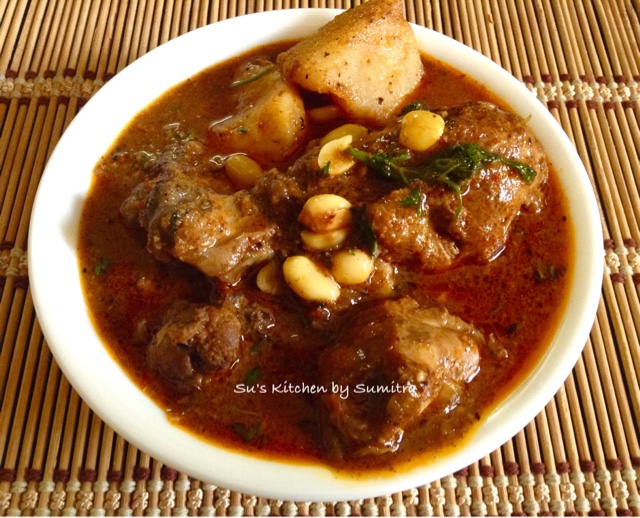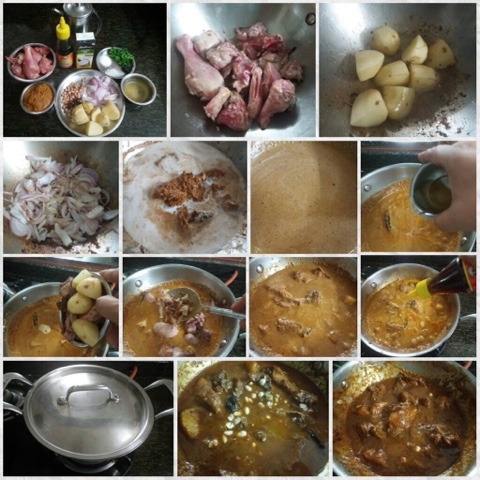Chicken Massaman Curry...
While browsing through the net, I found this very interesting write up regarding this dish.
Massaman or Matsaman is not a native Thai word. It is generally thought to refer to the Muslims with earlier writers from the mid-19th century calling the dish "Mussulman curry". According to Thai food expert David Thompson, as well as Thai journalist and scholar Santi Sawetwimon, the dish originated in 17th century Central Thailand at the cosmopolitan court of Ayutthaya, through the Persianmerchant Sheik Ahmad Qomi from whom the Thai noble family of Bunnag descends. Other theories contend that massaman is a southern Thai dish, influenced by Malay and Indian cuisine, or that its name is derived from the Malay word masam, which means "sour". The curry is extolled in a poem from the end of the 18th century, attributed to Prince Itsarasunthon of Siam, the later King Rama II (1767-1824). It is dedicated to a lady who is believed to be Princess Bunrot, the later Queen Sri Suriyendra, wife of King Rama II. The second stanza of the poem reads.....
The flavors of the massaman curry paste (nam phrik kaeng matsaman) come from spices that are not frequently used in other Thai curries. Cardamom, cinnamon, cloves, star anise, cumin, bay leaves, nutmeg and mace would, in the 17th century, have been brought to Thailand from the Malay Archipelago and South Asia by foreigners, a trade originally dominated by Muslim traders from the Middle East, Indian subcontinent and from the archipelago itself, but increasingly threatened by the Portuguese, the Dutch and French East India Company.These are combined with local produce such as dried chili peppers, cilantro (coriander) seeds, lemongrass, galangal/ ginger, white pepper, shrimp paste, shallots and garlic to make the massaman curry paste. Massaman curry paste is first cooked with coconut milk, before adding in the other ingredients. Massaman is usually eaten with rice, in a meal together with other dishes. There are also traditional versions using oranges, orange juice, or pineapple juice as additional ingredients.
Ingredients
4 Dried Chillies
1 small Onion sliced
6 Garlic cloves
1 small piece Ginger
1 Lemongrass stalks sliced
1/2 tsp Cumin seeds
1 tsp Coriander seeds
2 tbsp Dry Peanuts
2 Cardomom
2 Cloves
4 Pepper corns
1 small Cinnamon stick
1/4 tsp Turmeric powder
2 Pinch Nutmeg powder
1/2 tsp Shrimp paste
1/4 tsp Salt
1/2 tsp Oil Method
Take a pan, add oil. Add chillies, garlic, lemongrass,onions and ginger. Sauté it for 2 minutes. Remove it and keep it aside. In the same pan add cardamom, cloves, cinnamon, coriander, cumin and peanuts. Sauté it for 2 minutes, let cool. Mix in all the remaining ingredients and grind it in to a smooth paste.
Ingredients
500 grams Chicken pieces
2 medium size Potatoes, peeled and cubed
1 Onion sliced
6 tbsp Massaman curry paste
1 tetra pack Coconut milk
1/4 cup Chicken stock
1 tsp Fish Sauce
1/2 tsp Tamarind paste
2 tbsp Roasted Peanuts
Salt to taste
1/2 tsp Sugar
1 tbsp Coriander leaves
2 tbsp Oil Method
Heat oil in a pot. Add the chicken and cook until golden brown. Remove the chicken from the pot and keep it aside. Add the potatoes in the same pot and cook until brown. Remove from the pot and keep it aside. Add the onions. Cook the onions for a few minutes, until they begin to brown, and take it out and keep it aside. Add the Massaman curry paste and the coconut milk. Stir it for 5 minutes on a low flame. Add the chicken stock, fish sauce, chicken, potatoes and onions and bring it to a boil on medium flame. Reduce the flame, cover and cook until the chicken is tender and the potatoes are cooked, stirring it occasionally. Add the tamarind paste, salt, sugar and the peanuts. Stir in well. Sprinkle the chopped coriander leaves. Serve with hot rice.




No comments:
Post a Comment
Note: only a member of this blog may post a comment.